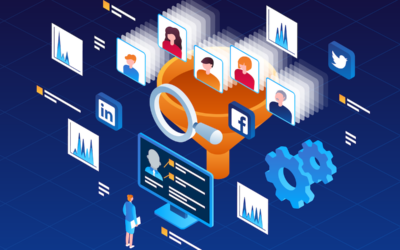Riding a motorcycle and driving a car are two very different skills. They both involve general capabilities like steering, shifting gears, braking and accelerating. But there are key differences and specifics you need to learn to be good at either. While driving a car is a great intro to the fundamentals, you can’t assume you’ll be competent on a bike if you’ve only sat behind the wheel.
In the same way, general and role-specific sales training each have a place in today’s sales organizations. General training gives each sales professional a basic foundation, while role-specific training equips them with the resources and sales skills needed for their unique position.
Role-specific sales training ensures that everyone in your organization learns the distinct knowledge, resources, and skills they need to contribute to your organization. This is important for companies that rely on the joint efforts of Marketing, Sales, Account Managers, and Customer Service, not to mention all the people managing all those departments, to reach their goals.
Today’s customers don’t make one decision to do business with you. They decide after every interaction with various departments in your company whether to continue doing business with you. One research company found that 76% of customers said they’d stop doing business with a company after just one bad experience.
That means everyone in the company must be customer-centric and focused on selling to some degree. It also means when designing a sales training program, one size doesn’t fit all.
That’s where role-based training comes in.
Training Needs of Different Sales Roles
Before diving deeper into the benefits of role-specific sales training, let’s take a quick look at what the most common sales roles in a company require.
Sales Manager
Sales managers lead sales teams—organized by business unit, region, or product. They plan, coach, motivate, and empower sales professionals on the team. This means they need to learn leadership skills and how to manage salespeople. They need training around hiring and building a team, setting expectations, and providing feedback.
Account Executive
Account executives (AEs) are responsible for bringing in new business. AEs must understand the buyer persona and the industry and have finely-honed prospecting, pitching, presentation, and negotiation experience.
Sales Representative / Sales Professional
The sales representative is responsible for generating revenue from new customers. Their training must focus on consultative selling techniques or whatever sales methodology their company followers.
Sales Development Representative
A sales development representative (or business development representative), is responsible for gaining new market share, increasing revenue, entering new markets, and finding new partners or clients. Similar to a typical sales representative, this role requires strong consultative selling skills, industry expertise, and the nuances of B2B or B2C customers.
Account Managers
Account managers are responsible for strengthening customer relationships, farming for new business, performing account maintenance, and handling difficult situations. They may serve as part sales representative and part customer service agent to their customers.
Technical Sales Representatives
Technical sales representatives specialize in technologically and scientifically advanced products. They use technical skills to assess customer needs, promote the benefits of relevant products, and demonstrate clearly how products work. They may act as a partner to account executives or liaison between the company sales team and customers, providing product demonstrations and technical information.
Company and/or Sales Team Specific Roles
Larger companies may have administrative assistants who perform clerical tasks generated by other roles. There may also be subject matter experts (SMEs) or dedicated personnel who present solutions to larger clients. While not specifically responsible for finding new customers or maintaining relationships after the initial sale, SMEs can play a pivotal role in the buyer’s decision-making process.
7 Benefits of Role-Specific Sales Training
Each position on a sales team benefits when they understand how their specific role contributes to acquiring, maintaining, and growing sales. Here are seven long-term advantages of role-specific training.
1. Boost Revenue
The greatest benefit to a company comes in the form of higher revenue. When each member of the sales team clearly understands their role and responsibilities, and are accountable to well-defined goals and metrics, they are able to work efficiently and effectively. Greater productivity will have a positive impact on the bottom line.
2. Increase Close Rates
Training your team to use the same selling process can have a significant impact on close rates. With role-based training, each member of the team learns how to contribute effectively to each stage of the deal from initial outreach to close.
As an example, IMPACT Sales Training teaches sales professionals skills that contribute to better close rates, including aligning the buyer’s journey to the seller’s process, identifying the buyer’s preferred communication style and adapting to it, and understanding buying motives based on buyer wants and position in the corporate structure.
3. Develop Expertise
Each sales role must learn how to handle specific circumstances to be effective.
The best sales training programs are designed with these role-based nuances in mind. For example, business development professionals must learn how to identify new potential business and how to transfer a lead back to an account executive. Account executives must learn how to negotiate and handle objections for each buyer persona.
4. Work More Efficiently
Role-based training allows managers to focus on developing specific skills needed for each position on the team. This allows organizations to target the skills needed in each role and—instead of training on a broad range of skills that may or may not be relevant—focus on role-specific needs and train more efficiently.
5. Improve Employee Retention
Sometimes employee turnover occurs because people aren’t trained to be successful. 2022’s job market saw a record high with two job postings for every unemployed individual in the country.
In an employee market (or any market for that matter), it’s good to remember the motivations of your current or potential workforce. Just as customers have different motivations for buying from your company, employees have different motivations for working there.
Millennials sometimes value training as much as compensation. With more Millennials in the workforce than any other generation, you need to factor training into your sales compensation packages.
6. Raise Engagement
Learners are always subconsciously asking themselves, “how does this apply to me?” If they can’t find an answer to that question, they will mentally check out of the training and check in on their email instead.
Role-based sales training is focused specifically on the learner’s day-to-day job responsibilities. Because of this, people who pay closer attention to the material are more engaged during training sessions.
When training is less abstract and makes more sense intuitively, sales professionals feel the training speaks to them and gives them what they need. This allows trainers, organizations, and learners to reap more value from each class
7. Increase ROI
When team members can successfully implement selling, coaching, or prospecting strategies that increase sales, revenue goes up.
Role-based sales training is an investment that pays off long-term. Your return on investment will be higher as retention and sales productivity improve.
8. Improve Employee and Team Communication
Just as every industry has its own language and terminology, each role within your organization has its own jargon as well.
That may not seem like a big deal until you realize that there are action steps connected to specific words.
Here’s a common example. Marketing works to generate a “lead,” who they expect the Sales Team will promptly call.
The Sales Team, however, only calls on “qualified prospects.” They may call a lead to discover if the prospect is qualified, or through research may determine a “lead” is unqualified and not worth a call.
A common language around the sales process would prevent this miscommunication. If both Sales and Marketing used the term “qualified prospect” and understood what that meant, they could have more productive business conversations.
Develop Individual Strengths and Overcome Weaknesses
No manager can coach someone using a process they themselves don’t understand.
Sales managers in particular can benefit from specialized sales training. This gives them the opportunity to learn how to reinforce sales techniques, improve sales coaching, and help struggling sales professionals identify and work on areas needing improvement.
With the proper tools and sales assessments to deliver role-specific training, sales managers are able to build better teams, be more productive, and generate a healthier bottom line.
Learn More
Download The 10 Most Common Sales Management Mistakes to learn how to avoid common pitfalls and lead a high-performing sales team.
Read our 7 Things to Look for in a Sales Training Company blog post and learn how to evaluate potential training partners.
Contact Us
Ready to transform your sales training program? Let’s start a conversation.




